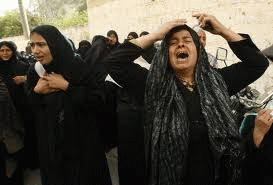The furor over the recent chemical weapons attack in Syria has overshadowed disturbing events to the south, as Egypt's generals wage a quiet war of attrition against the Hamas leadership in Gaza.
Hamas has found itself increasingly isolated, politically and geographically, since the Egyptian army ousted the country's first democratically elected president, Mohammed Morsi, in early July.
Hamas is paying the price for its close ties to Egypt's Muslim Brotherhood, the Islamic movement that briefly took power through the ballot box following the revolutionary protests that toppled dictator Hosni Mubarak in 2011.
Since the army launched its coup three months ago, jailing the Brotherhood's leadership and last week outlawing the movement's activities and freezing its assets, Hamas has become a convenient scapegoat for all signs of unrest.
Hamas is blamed for the rise of militant Islamic groups in the Sinai, many drawn from disgruntled local Bedouin tribes, which have been attacking soldiers, government institutions and shipping through the Suez canal. The army claims a third of the Islamists it has killed in recent operations originated from Gaza.
At an army press conference last month, several Palestinians "confessed" to smuggling arms from Gaza into Sinai, while an Egyptian commander, Ahmed Mohammed Ali, accused Hamas of "targeting the Egyptian army through ambushes."
The Egyptian media have even tied Hamas to a car bombing in Cairo last month which nearly claimed the life of the new interior minister, Mohammed Ibrahim.
Lurking in the shadows is the army's fear that, should the suppressed Muslim Brotherhood choose the path of violence, it may find a useful ally in a strong Hamas.
A crackdown on the Palestinian Islamic movement has been all but inevitable, and on a scale even Mr Mubarak would have shrunk from. The Egyptian army has intensified the blockade along Egypt's single short border with Gaza, replicating that imposed by Israel along the other three.
Over the past weeks, the army has destroyed hundreds of tunnels through which Palestinians smuggle fuel and other necessities in short supply because of Israel's siege.
Egypt has bulldozed homes on its side to establish a "buffer zone", as Israel did inside Gaza a decade ago when it still occupied the enclave directly, to prevent more tunnels being dug.
That has plunged Gaza's population into hardship, and dealt a harsh blow to the tax revenues Hamas raises on the tunnel trade. Unemployment is rocketing and severe fuel shortages mean even longer power cuts.
Similarly, Gaza's border crossing with Egypt at Rafah -- the only access to the outside for most students, medical patients and business people -- is now rarely opened, even to the Hamas leadership.
And the Egyptian navy has been hounding Palestinians trying to fish off Gaza's coast, in a zone already tightly delimited by Israel. Egypt has been firing at boats and arresting crews close to its territorial waters, citing security.
Fittingly, a recent cartoon in a Hamas newspaper showed Gaza squeezed between pincers -- one arm Israel, the other Egypt. Sami Abu Zuhri, a Hamas spokesperson, was recently quoted saying Egypt was "trying to outmatch the Israelis in tormenting and starving our people".
Hamas is short of regional allies. Its leader Khaled Meshal fled his Syrian base early in the civil war, alienating Iran in the process. Other recent supporters, such as Turkey and Qatar, are also keeping their distance.
Hamas fears mounting discontent in Gaza, and particularly a demonstration planned for November modelled on this summer's mass protests in Egypt that helped to bring down Morsi and the Muslim Brotherhood.
(Note: You can view every article as one long page if you sign up as an Advocate Member, or higher).






